SOUTH OF THE CLOUDS: YUNFEST TURNS FIVE
| July 15, 2011 | Post In LEAP 9

LATE IN MARCH, China’s wandering tribe of independent documentary filmmakers converged on the city of Kunming for the fifth edition of the Yunnan Multi Culture Visual Festival (Yunfest). Since the founding of the documentary biennale in 2003, Yunfest has become a mecca for alternative film culture in China, a voice for an emerging generation of filmmakers. Many of the festival’s premier documentarians came to filmmaking as amateurs— schooled on pirated DVDs of the Western classics, they simply decided to pick up DV cameras, often employing aesthetic sensibilities from backgrounds in other artistic media to produce their own films. Taking place at the Yunnan Provincial Library near Green Lake Park, in the heart of Kunming’s university district, the festival offered the public a rare chance to see cutting-edge works from a community of filmmakers who have taken up the task of documenting the social realities of China in transition.
In previous years, Yunfest has become a platform for discovering new talent among China’s burgeoning documentary filmmakers, drawing attention to their groundbreaking works that would otherwise not reach the public. As a form of expression, documentary filmmaking in China has emerged as a profound articulation of individual subjectivities, which, in the words of festival director Yi Sicheng, “resembles the role that poetry played in China during the 1980s, and rock ‘n’ roll in the 1990s.”
In the films from this year’s festival, it became clear how the field of documentary filmmaking in China has taken provocative new directions in aesthetic strategies and modes of storytelling. Shandong-based artist Li Ning’s Tape (Jiaodai, 2010) challenges and subverts conventions in the documentary form. His maniacal obsession with the qualities of tape forms the concept for his avant-garde dance and performance art troupe’s three-year saga spent occupying public spaces with deftly choreographed dance routines and performative interventions in Jinan, the capital of Shandong province.
Other standout films included Zhang Zanbo’s intimate documentation of a karaoke hostess in A Song of Love, Maybe (Lian qu, 2010) and Wei Xiaobo’s self-reflexive exploration of the everyday through the story of him and his girlfriend in The Days (Shenghuo Eryi, 2011). The festival also featured a retrospective of richly philosophical, ethnographically inflected works from Mao Chenyu.
Perhaps making the biggest splash at the festival was Kunming-based filmmaker, He Yuan, who presented his recent work, Apuda (Apuda de Shouhou, 2010). Set in a Naxi minority village in Yunnan province, the film is a radical departure from what the audience might expect to be an ethnographic film. Documenting Apuda as he cares for his ailing father, who awaits his death in a village where nothing seems to happen, the film becomes a kind of absurdist epic. The most dynamic action we witness on screen is the changing of a tattered shirt, the lighting of a weathered tobacco pipe, or the shifting blue to gray hues of a thunder storm materializing overhead. The film’s at times painfully long takes become a kind of aestheticization of slowness, a meditation on the passing of time. At this year’s festival, the jury of critics and filmmakers awarded Apuda the grand prize.
For the occasion, festival director Yi Sicheng edited an anthology of film criticism and essays, Today, or The Golden Age, which includes writings from prominent filmmakers in the independent documentary scene, along with criticism from a committed group of scholars, including Zhang Yaxuan and Zhang Xianmin. With Yunfest, the organizers are not merely running a film festival, but creating an infrastructure for a contemporary archive as they collect and exhibit films, promote dialogue on the state of Chinese society, and build a framework in which the future of this image-making culture can be cultivated. We find that documentary filmmaking can be likened to an act of writing, and the lyrical representations of reality that become apparent in the films at Yunfest will undoubtedly become social artifacts of the future.

